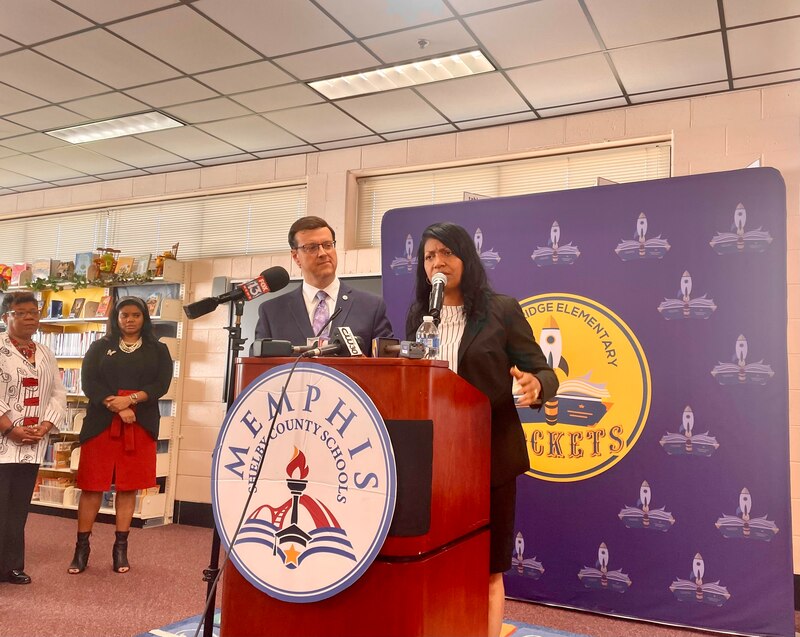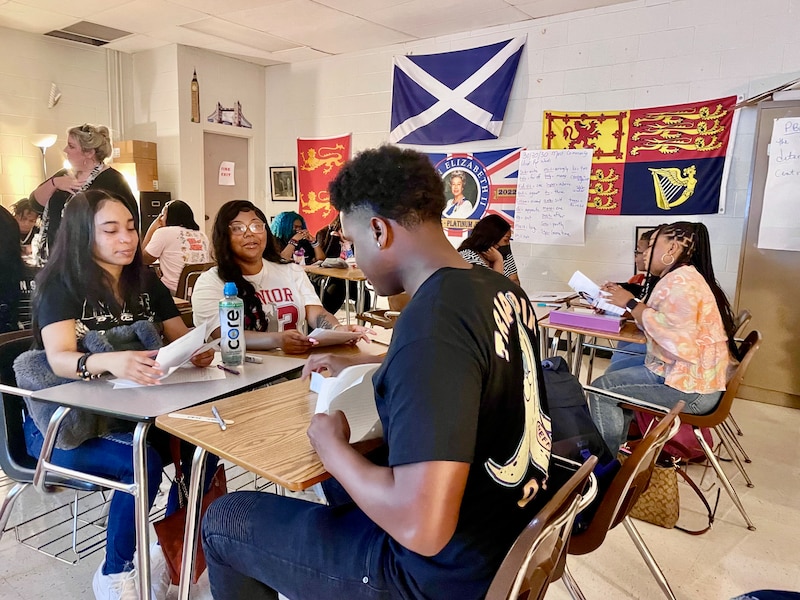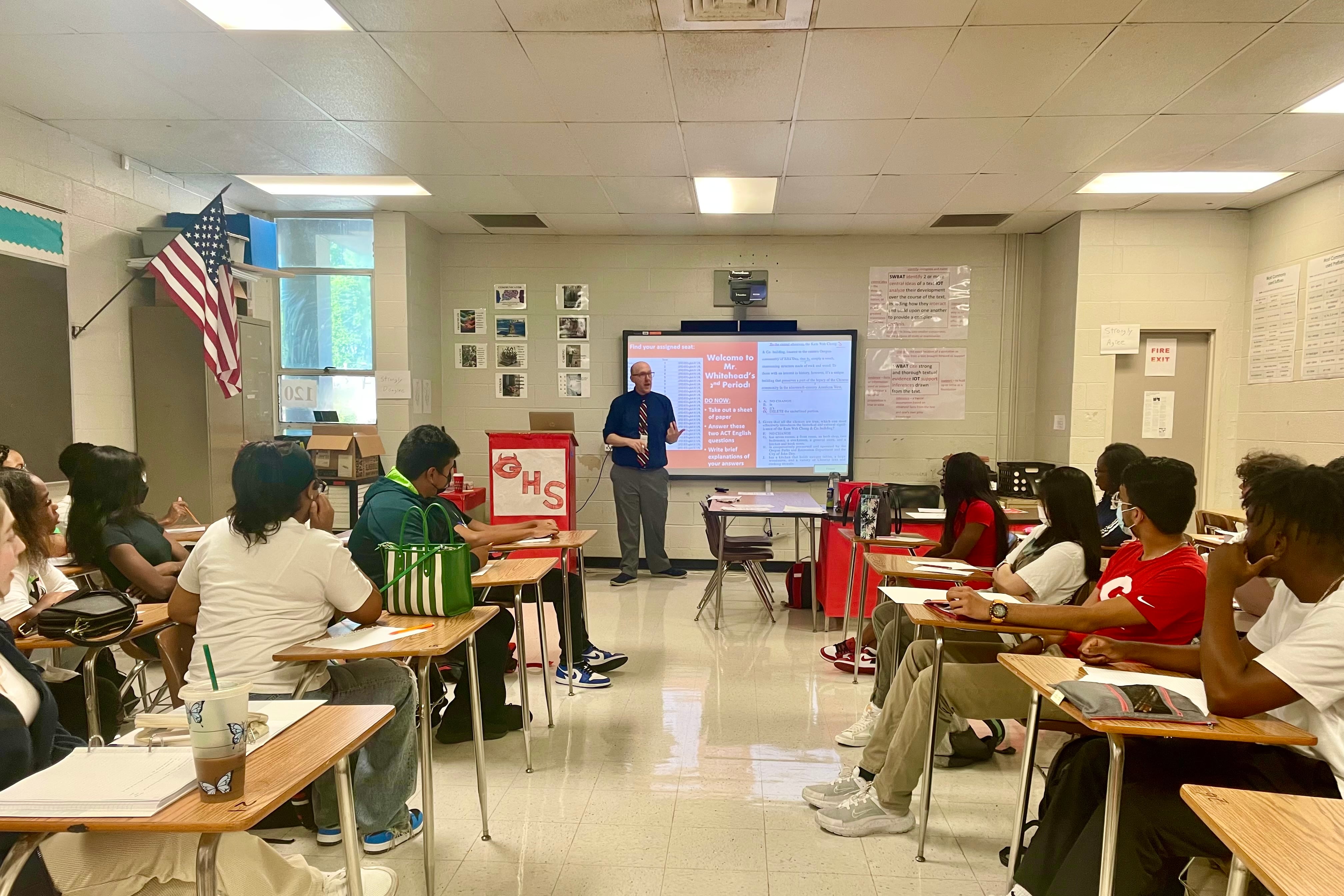Rayvn Webster hasn’t had a typical high school experience.
Just before Webster began her freshman year at Germantown High School in 2019, her dad died suddenly of a heart attack, right around Father’s Day and his birthday. Nine months later, as Webster continued to grieve and adjust to high school, Memphis-Shelby County Schools closed its doors due to COVID. And the pandemic would continue to wreak havoc on Webster’s sophomore and junior years.
Reflecting on the first day of her senior year Monday, Webster said she feels something she hasn’t felt in a while: normalcy.
Webster was one of over 100,000 MSCS students to return to classrooms on Monday for the first day of 2022-23 — which students, educators, and administrators hope will deliver on their wish for a perfectly normal year.
At Germantown High School, minutes before the first bell rang Monday, hundreds of students milled around outside, chatting and laughing with their peers as they trickled into the building for class.
Donning their first-day-of-school best, students carried backpacks stuffed with school supplies and greeted teachers and friends. And for the first time in years, they were unencumbered by thoughts of masks, virtual learning, and the many other COVID restrictions they’d become accustomed to.
In many ways, the first day of school seemed to signal the comeback everyone had expected last year when they returned to classrooms for the first time in 18 months, only to have to deal with more COVID surges, ever-changing mask guidance, staffing struggles, and mental health issues, among other challenges.
In other ways, the start of the year is anything but normal. Questions about who will lead MSCS this school year and beyond continue to loom over Tennessee’s largest school district.
Superintendent Joris Ray remains on paid administrative leave pending an external investigation into whether he abused his power and violated district policies by engaging in relationships with subordinates. It remains unclear how long the investigation will last, but Ray’s fate with the district will likely be decided by the new school board formed after Thursday’s election.
And like most urban school systems across the nation, Memphis faces a number of other difficulties, such as continued academic recovery needs from the pandemic, declining enrollment, and gun violence.
District leaders stressed Monday that they’re focused on supporting students and families and continuing the academic growth shown on the district’s most recent state standardized test scores.

Deputy Superintendents John Barker and Angela Whitelaw, who are filling in for Ray, spent the day visiting schools across the county to “wrap their arms around” the district community. At a press conference Monday morning at Hickory Ridge Elementary School, Barker called the first day a celebration of the district’s parents, students, educators, and staff.
“It’s a great day for a great day,” Barker, deputy superintendent for strategic operations and finance, told the crowd of reporters, district administrators, and teachers. “This is the first day of the best school year.”
Tennessee Education Commissioner Penny Schwinn also joined Barker and Whitelaw on Monday for a tour of Bolton High School, home to a new AgriSTEM program, and Germantown High School, one of four Shelby County campuses affected by a new state law that could force the Memphis district to cede the properties to suburban school systems.
Schwinn lauded what she saw at Bolton and Germantown, as well as the district’s overall academic improvement this year, which she credited to leaders’ focus on literacy and their use of federal COVID relief funding for tutoring and reducing student-to-adult ratios.
“That’s the kind of work that you want to see, and I’m very excited about what their trends are showing,” Schwinn said.
Many of those same tactics will continue this year, Whitelaw said, as the district has its sights set on new long-range goals: It wants 74% of students to be reading on grade level by 2030, and 70% of students to be on grade level in math.
“We believe that literacy is the backbone for our district; it is the jumping off to all of our students,” said Whitelaw, deputy superintendent of schools and academic support.
Whitelaw and Barker also emphasized rebuilding trust throughout the community and improving the culture and climate in schools. They shared a new acronym they’re using to guide their leadership: CARES, for compassion, accountability, respect, exquisite execution, and servant leadership.
Asked whether becoming acting co-superintendents has caused any challenges for them or the district, Whitelaw said that Ray’s cabinet has always been a tight-knit team and that, while she and Barker have added responsibilities, they “know how to handle those challenges.”
“I think the beginning of the year is always a pressing time for us, because we want to make sure things are right for students and families,” Whitelaw said. “I think every day we get up trying to do the very best that we can; that we know how to do.”
MSCS board Chair Michelle McKissack said the transition to Barker and Whitelaw was seamless, and the board has “complete confidence in our leadership at every level of the school district.”

District-level leadership wasn’t on Webster’s mind Monday as her last year at Germantown High School kicked off. After all the hardships of the last several years — her dad’s death, the social isolation of online learning, the difficult adjustment back to in-person learning last year even as COVID raged — Webster says she and many of her peers are focused on soaking up all the normalcy they can get.
“For a while, I was drained. I was battling through depression with everything I could. I had no energy to get up and go out, and it was terrible,” Webster said. “It was the same for my friends, too.”
“I just hope this year continues to be good — or maybe even gets better,” she added. “It’s my last year. I want to have fun before the cap and gown.”
Samantha West is a reporter for Chalkbeat Tennessee, where she covers K-12 education in Memphis. Connect with Samantha at swest@chalkbeat.org.






